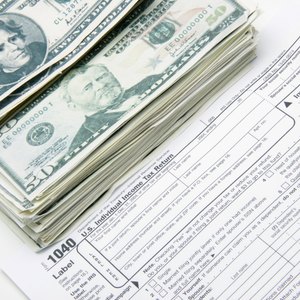
Selling your investment property isn't like selling a personal residence. While the government protects gains on personal residences to help encourage homeownership, they don't do the same for your rental property. You will have to pay tax on both your profit and on any depreciation you claimed. However, you may be able to avoid paying these taxes if you buy more investment property or if you live in the property before selling it.
Calculating Your Basis and Your Profit
The first step in determining your tax liability is to calculate your adjusted cost basis in the property. Your adjusted cost basis isn't the purchase price. It's what you paid for the property after adding in all of your closing costs and the cost of all the improvements you made to it. Add up all of the depreciation you claimed against the property as well. To find your profit, subtract the adjusted cost basis from your sales basis, which is the net selling price after subtracting the costs of the sale, such as any commissions you paid.
Capital Gains Tax
When you sell the property at a profit, the Internal Revenue Service will levy capital gains tax on the profit. As long as you held the property for at least one year, the capital gains tax rate in effect in 2013 is 15 percent -- or 20 percent if your taxable income as a single taxpayer is more than $400,000 or $450,000 if you are married and file jointly. You will also have to pay an additional Medicare surtax of 3.8 percent of your gain if your taxable income is over $200,000 -- or $250,000 if you are married.
Section 1250 Recapture Tax
If you sell your property for more than your depreciated basis, you will have to pay Section 1250 tax, also known as depreciation recapture on the depreciation. To calculate your depreciated basis, subtract your accumulated depreciation from your adjusted cost basis. The amount between your depreciated basis and your selling price, up to the difference between the depreciated basis and the adjusted cost basis, is subject to a 25 percent tax, as well as to the Medicare surtax.
1031 Exchanges
One way to avoid paying these taxes when you sell your investment property is to use the proceeds to buy another piece of investment property. Section 1031 of the tax code lets you sell a property, buy more property and carry your basis forward without incurring any taxes. To do this, you will need to follow the IRS' stringent rules about having a third party hold your money between the sale and the replacement purchase and you will need to meet the IRS' timelines.
Residential Conversions
Another way to avoid some of your gains is to turn your rental property back into your primary residence. If you live in the property for at least two years, you will be eligible to claim a portion of the $500,000 exclusion, or $250,000 exclusion if you aren't married and filing jointly, on sales of a personal residence. Your exclusion is limited by the number of years that you rented the property. For instance, if you owned the property for eight years and lived in it for three, you'd be able to exclude three-eighths of your gain from taxes. On the other hand, if you owned it for seven years and lived in it for five of them, you'd be able to use five-sevenths of the exclusion, which is $357,142 if you're married and filing jointly.
References
- RealEstate: A Crash Course in Tax and Investment Property
- IRS: Publication 17 -- Your Federal Income Tax
- IRS. "Publication 551 (Rev. December 2018) Cat. No. 15094C Basis of Assets." Page 2. Accessed June 23, 2020.
- IRS. "Publication 551 (Rev. December 2018) Cat. No. 15094C Basis of Assets." Page 5. Accessed June 23, 2020.
- IRS. "Topic No. 701 Sale of Your Home." Accessed June 23, 2020.
- IRS. "Publication 544 Cat. No. 15074K Sales and Other Dispositions of Assets." Page 27. Accessed June 23, 2020.
- IRS. "Publication 551 (Rev. December 2018) Cat. No. 15094C Basis of Assets," Page 2-3. Accessed June 23, 2020.
- IRS. "Publication 551 (Rev. December 2018) Cat. No. 15094C Basis of Assets." Page 4-5. Accessed June 23, 2020.
- IRS. "Publication 946 Cat. No. 13081F How to Depreciate Property." Accessed June 23, 2020.
Writer Bio
Steve Lander has been a writer since 1996, with experience in the fields of financial services, real estate and technology. His work has appeared in trade publications such as the "Minnesota Real Estate Journal" and "Minnesota Multi-Housing Association Advocate." Lander holds a Bachelor of Arts in political science from Columbia University.

